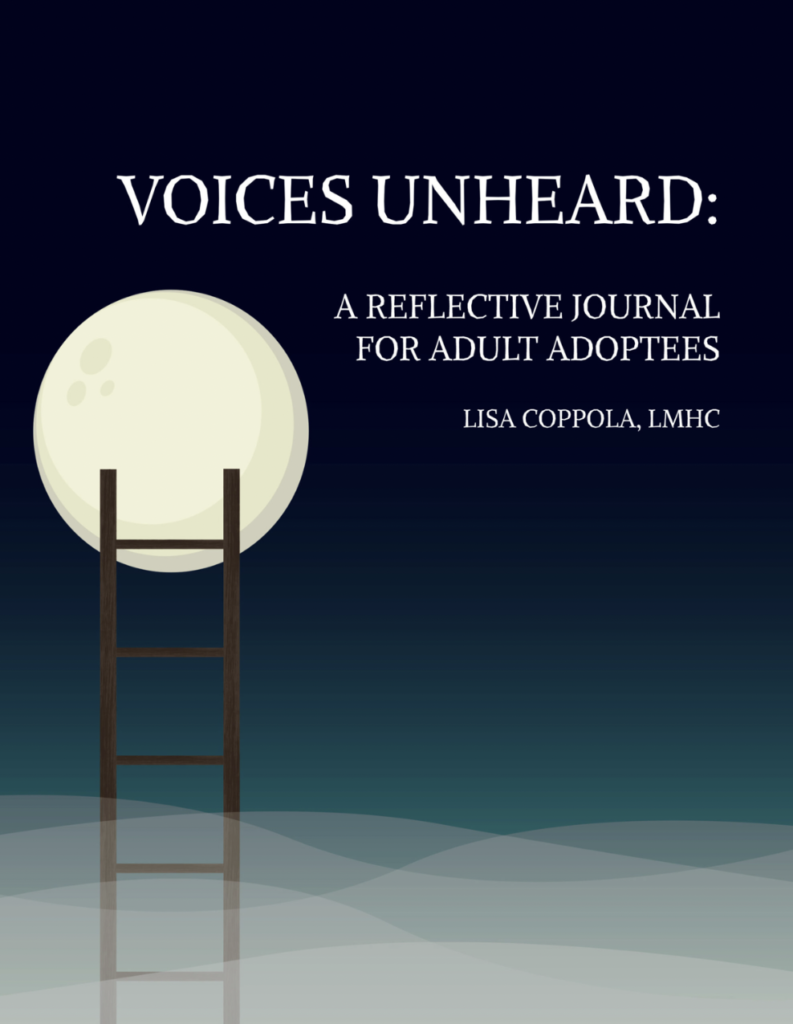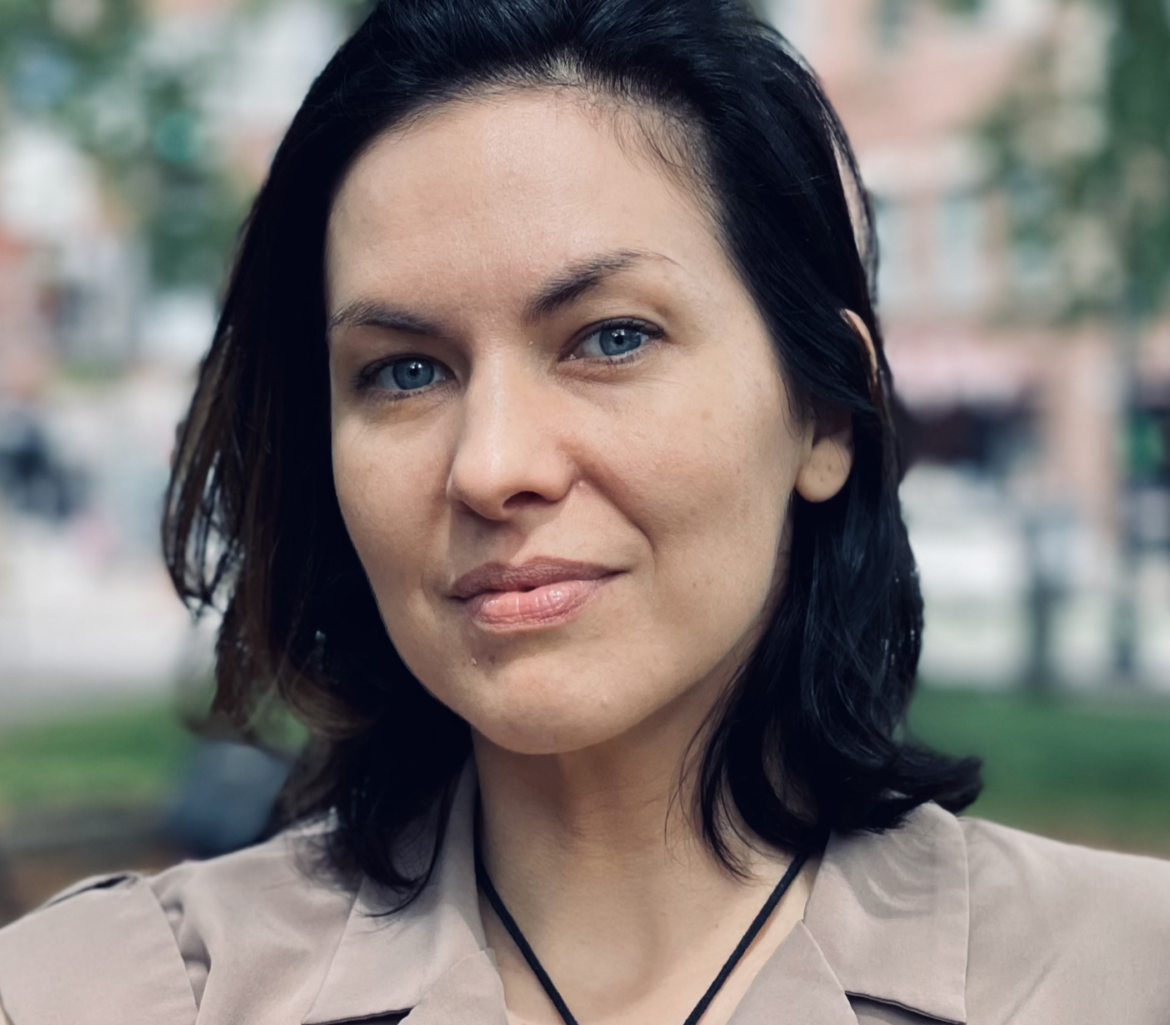Lisa “LC” Coppola, a domestic adoptee through the department of children and family, is a mental health counselor who has years of expertise counseling adult adoptees and others touched in any way by adoption. A heartfelt advocate for those relinquished, she’s also a therapist and, in collaboration with Boston Post Adoption Resources, is the creator of the Voices Unheard: Real Adoptee Stories speaker and writing workshop series. A writer from the Boston area, she often explores themes concerning relinquishment and addiction. Now, she’s created a resource to guide therapists and peers who work with adoptees. Voices Unheard: A Reflective Journal for Adult Adoptees is a 52-week journal with prompts based on core themes that emerge in therapy and a script to help group facilitators. The journal can be used by adult adoptees on their own or under the care of a therapist, by therapists as a tool in their practice, and by peer-led support group moderators.
How would you describe this journal and what makes it unique?
The book is a guided journal, yes, but it is so much more than this. It offers 52 guided writing prompts based on common themes in adoption that we see clinically at Boston Post Adoption Resources, a nonprofit mental health agency. But the prompts are framed with resources including a post adoption vocabulary section and suggested reading, so the individual writer has access to knowledge if they want to do a deeper dive of study. The combination of prompts and resources also assists mental health professionals who might not be well versed in adoption-related challenges or therapies. Most graduate-level programs only spend eight minutes on the topic of adoption, believe it or not. So therapists can use this journal to become more informed about adoption loss and then as an aid to guide adoptees out of the fog—meaning out of the denial of the complex trauma of their adoptee experience.
Probably the part I am most excited about is where I include detailed instructions for adoptee volunteers—peers who might want to coordinate peer-led support groups. The instructions cover how to establish a group and how to organize weekly meetings using the journal prompts as themes and assignments, and even include a script to make the idea of running a meeting less daunting and more do-able.
How did you come up with this idea?
As a mental health counselor, I’ve had more than a decade of experience in running writing support groups and workshops on the themes of identity, recovery, relationships, and other issues that both adoptees and people in recovery from addictions struggle with. As an adoptee and person in long-term recovery from addictions, I’ve been a participant and beneficiary of these types of groups and therapeutic activities myself, so I’ve seen the value from both sides. When people come together to acknowledge a similar struggle, there’s a sort of belongingness that develops that I have seen to be the most powerful kind of healing. You see this all the time in the addiction recovery world. As adoptees are going through this kind of mysterious buried pain and grief, and one that is hardly discussed in public, I knew that they really could benefit from this kind of peer-to-peer recovery. So I wanted to combine my dual experiences to offer something bigger and more impactful than a traditional prompted writing journal, something with legs and utility to empower adoptees with a tool and to enlarge the professional and volunteer post adoption support system.
How is writing for adoptees valuable and therapeutic?
As a mental health counselor, I find that journaling on one’s story, trying to sort out the truth through telling the story, sifting through fears and hopes on paper, is incredibly powerful. It’s a way to help clients work their way through disparate and confusing emotions and memories, to identify common threads throughout their lives, and ultimately to connect to the truth of their uniquely personal stories. In individual and group sessions, I guide the journaling process with carefully planned prompts that guide the writer through a revelatory and healing process over time.
How did you come to discover writing as helpful in your own experience?
I’m an adoptee who has spent a lifetime confronting a history of trauma—quite common in adoption—as well as addiction, and who ultimately has found a path to healing. I share part of my past openly in the early pages of the Voices Unheard Journal. Writing and support groups have been my lifeline. I’m working on a memoir myself, and through this process I’ve been able to really get in touch with who I am at my core. Of course, as an adopted person, who I am has always been a confusing, kind of clouded thing, and with writing a memoir I had to really get to know myself on a new level to write my character. I had to look at the pain I came up against in my life and how I got through it. I feel stronger now than ever in who I am and in my own strength and resilience. The journaling process really helped me understand my story to the extent needed in order to write the more structured linear story.
Why the focus specifically on adopted adults?
So often in our practice we meet adoptees who are not aware until adulthood of the depth or the impact of their traumas. For example, I worked in addiction recovery programs for many years and during that time found that adoptees made-up a disproportionate number of my clients. As I worked with them, sometimes for years, and as they gained some good time in sobriety, they often discovered that a root cause of their need to self-medicate was coming from a place of unprocessed grief around their relinquishment experience. In childhood, the adoptee trauma can look like a learning disability, or anxiety, or depression, or issues with love addiction or love avoidance. But once you peel back those layers of the onion, as they say, it’s all linked to that original wound manifesting. And many counselors, adoptive parents, and teachers have never been educated that adoption trauma even exists, so kids rarely ever get to address it while they’re young. Boston Post Adoption Resources and other adoption trauma-informed organizations are starting to change this now. Also another reason I designed this book for adult adoptees is that many are beginning to search for biological families. This is a hard, confusing, process that needs support.
Tell us more about the cover art.
The design was created by our own clinical director, Kelly Dibennedetto, and her husband, Albie. It was based on that notion of “coming out of the fog.” The fog at the bottom represents the concept of denial around the adoption trauma experience that many adult adoptees face. The ladder provides hope for progress—a path to discovery and insight—as it connects adoptees to their own stories on a journey to healing.
What kind of feedback have you had so far on the journal?
We are very excited that some highly renowned adoptee writers and adoption professionals have really embraced the journal and generously provided written endorsements. In fact, Sharon Kaplan Roszia, co-author of one of the most important pieces of literature used by therapists trained in adoption competency, validates the approach of this journal and says it’s “long overdue” in the field.
What other projects/ books are happening at Boston Post Adoption Resources?
BPAR already has an acclaimed illustrated book called Adoption Is a Lifelong Journey, written from the perspective of a child adoptee and offering tools and tips to parents. It was released five years ago. We also published a free eBook for parents/caregivers called Voices in Transracial Adoption to share the lived experiences of transracial adoptees through interviews. We’re seeking funding to build an online post adoption resources learning center to educate on a deeper level on specific topics.





